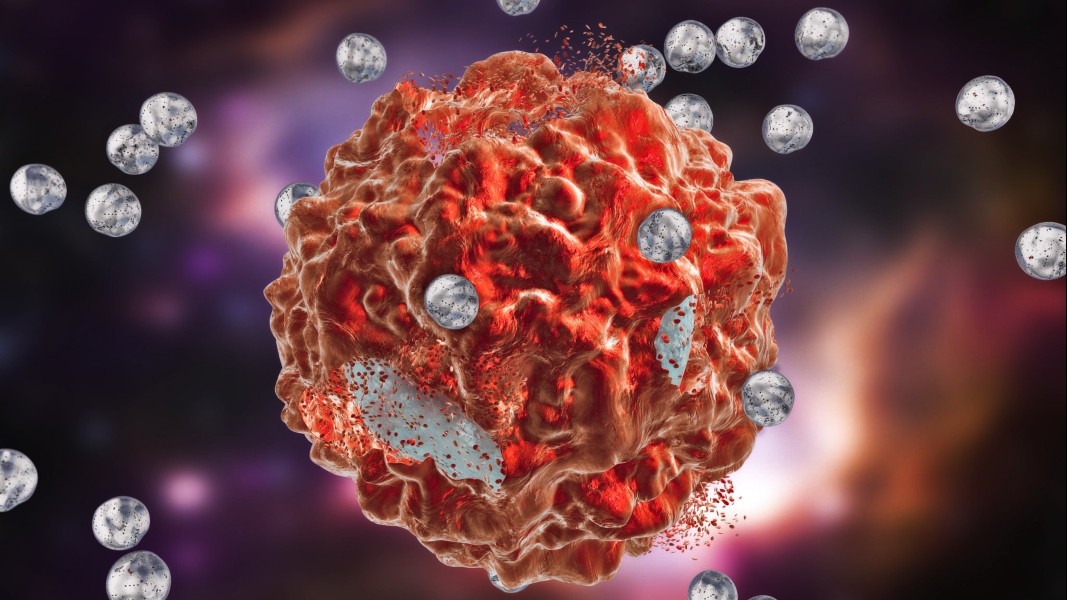The use of nanoparticles in medicine is a relatively new practice. The day is not far off when the much-sought-after drug will appear on the market, which will precisely destroy cancer cells without damaging the healthy tissue. Nanotechnologies that purify from pollutants, such as antibiotics, hormones and pesticides, are also starting to find application.
The scientific work of the young Bulgarian chemist Dr. Ivalina Trendafilova * are also focused in this field. Her efforts are used in the diagnosis and treatment of various diseases. For example, in addition to being able to detect newly formed cancer cells, nanoparticles can be designed to bind the chemotherapeutic agents directly to them.
"We know that chemotherapy substances damage not only tumor cells, but also healthy cells," Ivalina explains. "By incorporating drugs into these carriers that I synthesize, we can get to the tumor or infected tissue and release the drug there without poisoning the whole body, which is an extremely great advantage.”

Nanotechnologies can also improve the solubility of biologically active substances of natural origin and thus allow the delivery of the active substance to the desired organ or tissue.
Used as catalysts in the decomposition reactions of pollutants, nanoparticles can also be used as a purifying agent:
"These are usually oxidative reactions that treat wastewater from various industries. The harmful substances in it are in very small concentrations, which are considered admissible. This leads to their re-release in nature. In recent years, however, research has shown that their accumulation in soils and water basins causes serious problems, These organic pollutants affect the reproduction and populations of species. The systems I am developing are in this direction - purification from micro-pollutants, with the aim of their complete decomposition into water and carbon dioxide, or at least into substances which could not harm as much as the original substances."

Due to her diligence and dedication to science, Ivalina Trendafilova has won the most prestigious scholarship in the field of science, under the “Maria Sklodowska – Curie” programme (MSCA). The program is held at the University of Namur, Belgium, where she will continue her research. After she gathers more experience and knowledge, she is planning to return to Bulgaria and pass them on to her colleagues. Her dream is to contribute to the development of science in Bulgaria at the world level:
"When something is close to your heart and you know that this is your vocation and passion - you do your best and move on. I still keep saying that I want to develop in science. It excites me, makes me face new challenges every day, it makes me think, read, and solve problems. I want to stay in science. Waking up with a desire to work is an advantage that few people have.
* Ivalina Trendafilova is a senior reseach assistant and doctor at the Institute of Organic Chemistry with a center in phytochemistry at the Bulgarian Academy of Sciences, Sofia.
She is the author of dozens of scientific publications in the field of nanosciences and nanotechnologies.
Manager of projects for the development of new nanocomposite systems and new supply systems for bioflavonoids.
Winner of awards and distinctions, including the Young Scientist Award "Prof. Marin Drinov ”, scientific direction“ Nanosciences, new materials and technologies”, Sofia, Bulgaria, 2019.
In 2020 she was among the six nominees for the National Award for Young Talent in Art and Science of the "13 Centuries of Bulgaria” National Endowment Fund.
English: Rossitsa Petcova
Photos: fund13veka.bg, archive
An innovation for the treatment of diabetic foot ulcer using the patient's own tissue and artificial intelligence has been implemented at the University Multi-profile Hospital for Active Treatment-Burgas. Bulgaria is the fourth European country to start..
Over 3.5 million Ukrainians have arrived in or passed through Bulgaria since the beginning of the war. Nearly 200,000 people have found temporary shelter in the country, announced Anna Tertychna from the Ukrainian Embassy in Bulgaria. She..
At the Bulgarian Embassy in London, Prof. Bettany Hughes presented excerpts from the new BBC series - Wonders of Bulgaria. Prof. Bettany Hughes is the author of two episodes of the documentary. Hughes is a historian, writer, author of..
Who said Bulgarians were grumpy pessimists? Take a stroll through Sofia's Christmas bazaars and meet the cheerful crowd. The festive decorations, music,..

+359 2 9336 661
